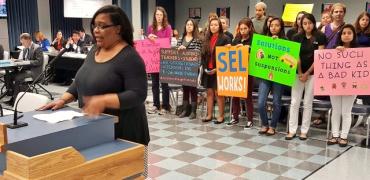An end to suspensions of toddlers and young children, in place for nearly a year now, is helping the littlest students thrive in Austin, Texas, says an AFT activist who led her union's drive for the ban.
Austin's school board adopted the no-suspension policy last spring after it was spearheaded by Education Austin, including PSRP chair and former attendance specialist Trasell Underwood, whose own 3-year-old son was suspended three times during the course of her advocacy.
The board unanimously approved the ban on suspending students from pre-K through second grade. Board members were persuaded by the union and its partners, including the superintendent and Texas Appleseed, a research and advocacy group devoted to ending the school-to-prison pipeline. Before the vote, dozens of parents, educators and students urged the board to address kids' emotional needs instead of throwing them out of school. The ban also prohibits placing children younger than third grade in an alternative disciplinary setting, except as required by law.
The union won several other "non-negotiables" too, says Underwood, a vice president of Education Austin. There's training for every school employee who works with children; nine additional staff members to support classroom management; more coaches for social-emotional learning; and a "mindfulness" or "cool-down" room, which is decidedly not an in-school suspension classroom because children get back to class within two hours or the next day.
Top of mind for everyone behind the change is shrinking the disproportionately high suspension rate for African-American boys. According to district data, black and Hispanic students were more likely to have disciplinary action taken against them than their white classmates.
Educators and officials said they saw the ban as a chance to make a cultural shift. Novice white teachers, Underwood says, may perceive minor infractions as out-of-control, while a "veteran-rich faculty" knows how to roll with kids of color. For example, she says, a young child required to act as the adult at home may push back against an inexperienced educator.
In her 12 years with the school district, Underwood herself became deeply experienced on this topic. As a former middle school attendance specialist, she would track students' whereabouts, entice them to come to school, and work as a parent liaison. Before that, she worked as secretary to a vice principal. She wrote up suspension paperwork but often went above and beyond, conducting home visits, calling parents and working closely with the parent support specialist to connect students with services, like going go to appointments with a pregnant student. "Some would consider that beyond my job description," she says, "but not really." Sometimes, she says, she'd be the first adult a child had talked to.
That's why the Austin policy's rollout builds on existing restorative practices of many kinds, like talking circles, which build relationships and trust. Part of the plan includes communicating better with parents and getting them more involved. In the first three months of 2017, Underwood received three suspension calls about her adopted son, who never even understood why he was in trouble.
She told the board that parents want to be a resource for teachers, but that often, parents aren't contacted before their kids hit a crisis. "Where are the parents' voices? Where are the parents?" she asks. "They knew me as a union leader. I wanted to give them the perspective of a parent. They'll call us to pick the child up, but where are those phone calls?"
Now that the ban is working, Underwood says, she's proud that "we as a union decided to take up this issue. After immigration, it's our most important cause."
[Annette Licitra]

